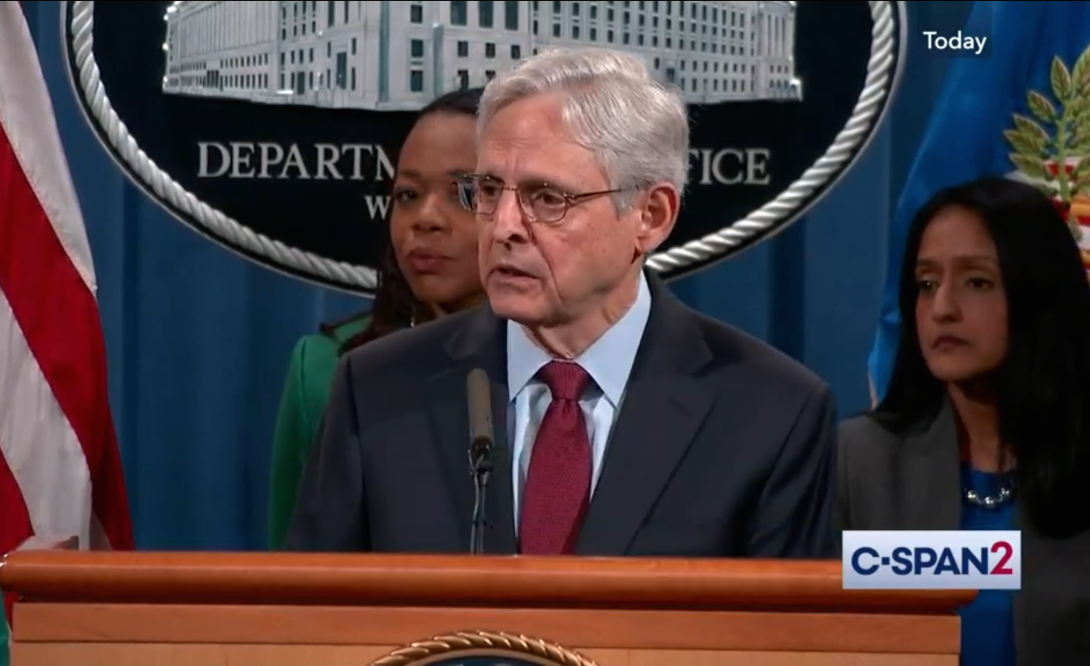SCOTUS complicates DOJ's challenge of Georgia's restrictive voting law

From left, Assistant Attorney General for Civil Rights Kristen Clarke, Attorney General Merrick Garland, and Associate Attorney General Vanita Gupta last week announced that the U.S. Department of Justice was suing Georgia over its restrictive new voting law under Section 2 of the Voting Rights Act. This week the U.S. Supreme Court handed down a decision in a case out of Arizona that weakens Section 2, complicating the DOJ's effort. (Image is a still from C-SPAN video.)
On June 25, the U.S. Department of Justice announced that it was suing the state of Georgia over its restrictive new voting law. Part of a wave of such legislation taken up by Republican-led states in the wake of last year's historic voter turnout and defeat of President Trump, Georgia's law among other things requires ID for mail-in voting, limits the use of ballot drop boxes, makes it a crime to offer water to voters waiting in line, and expands the legislature's control over the state election board.
"The right of all eligible citizens to vote is the central pillar of our democracy, the right from which all other rights ultimately flow," said Attorney General Merrick Garland in announcing the filing. "This lawsuit is the first step of many we are taking to ensure that all eligible voters can cast a vote, that all lawful votes are counted, and that every voter has access to accurate information."
The DOJ sued under Section 2 of the Voting Rights Act, which bars denying or abridging the right to vote on account of race. That section was untouched by the U.S. Supreme Court in its landmark 2013 Shelby County v. Holder ruling that effectively struck down Section 5's federal preclearance requirements for election changes in states and localities with a history of voter discrimination. The DOJ lawsuit alleges that Georgia lawmakers knew about the "cumulative and discriminatory effect" of the law's provisions — particularly on Black voters — and adopted the law anyway.
But on July 1, in a ruling in a case out of Arizona, the Supreme Court weakened Section 2 — and it did so in a way that jeopardizes the DOJ's arguments against Georgia's law.
Brnovich v. Democratic National Committee was filed in 2016 over new voting restrictions in that state: one barring out-of-precinct voting, and one barring the return of a person's ballot by someone other than a postal worker, elections official, caregiver, or household or family member. The 9th U.S. Circuit Court of Appeals in San Francisco found the laws discriminated against voters of color, who are about twice as likely to cast ballots out of precinct than white voters. But the high court reversed the ruling in a 6-3 decision authored by Justice Samuel A. Alito Jr. The ruling sets guidelines for challenges brought under Section 2 that would prevent state election laws from being struck down just because they affected communities of color more.
In the dissenting opinion written by Justice Elena Kagan, the court's three liberals protested the weakening of VRA protections, calling the decision "tragic." President Biden also expressed frustration.
"I am deeply disappointed in today's decision by the United States Supreme Court that undercuts the Voting Rights Act, and upholds what Justice Kagan called 'a significant race-based disparity in voting opportunities," Biden said in a statement. "In a span of just eight years, the Court has now done severe damage to two of the most important provisions of the Voting Rights Act of 1965 — a law that took years of struggle and strife to secure."
Here's how voting rights expert Rick Hasen explained the ruling at his Election Law Blog:
Rather than focus on disparate impact — whether a law leads to minority voters registering or voting in lower numbers — the court applies a much broader totality of the circumstances test with a huge thumb on the scale favoring the state and its restrictive law. If a law imposes just a "usual burden of voting," and the burden on minorities is not too much, and the state can assert (but does not need to prove) a significant interest in preventing voter fraud or another interest, then the law can stand.
"This is not a death blow for Section 2 claims," he added, "but it will make it much, much harder for such challenges to succeed."
Hasen also said the decision will make it "that much harder" for the DOJ to prevail in its suit against Georgia, even though the department appeared to anticipate the Supreme Court's ruling by arguing in its filing that Georgia lawmakers had acted with discriminatory intent.
But Marc Elias, a prominent voting rights attorney who has sued numerous states over voting restrictions, cautioned against viewing the ruling as a death blow to Section 2. "To naysayers who say all is lost, I remind you that the effects test was narrowed, but not eliminated. Purpose claims remain," he tweeted. "To the GOP legislatures who cheer the narrowing of protections for minority voters, we are not done fighting your suppressive laws."
Following the ruling, Biden renewed his call on Congress to pass the For the People Act and the John Lewis Voting Rights Act, proposals that would help make up for the weakening of the VRA. Both measures face an uphill battle in the closely divided U.S. Senate that still allows the anti-civil rights filibuster.
Tags
Benjamin Barber
Benjamin Barber is the democracy program coordinator at the Institute for Southern Studies.
